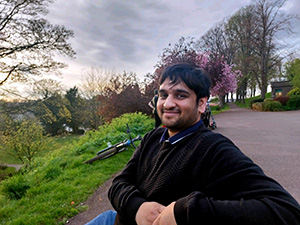Transforming businesses: MSc graduate turns Lead Data Scientist
In today’s data-driven world, the potential for groundbreaking discoveries, pattern recognition, and informed decision-making is immense. But data means nothing unless we have the right people with the right skills to work with it.
One of those talented people is Vignesh, a recent MSc Data Science graduate from the University of Bristol. Sharing his experience of the course, Vignesh tells us how his MSc journey paved the way to his current role as a Lead Data Scientist at a cutting-edge technology solutions firm.
Driving digital transformation in manufacturing
“I currently work as a Lead Data Scientist at Knowledge Lens based in Solihull where one of my main responsibilities involves working with various clients in the manufacturing domain. First I work with them to understand the needs of the business. Then I will design analytical solutions that will help them to digitally transform the factory floor. This will enable smart machines and devices to communicate with each, allowing factories to become more efficient, flexible, and productive. It also allows for things like customising products more easily, predicting when machines might need maintenance, and managing the supply of materials more effectively.
“I also get involved in some niche and exciting projects in the Natural Language Processing (NLP) and computer vision domains, helping members of the data science team to build intelligence into the company’s internal products.
Masters modules to improve data accessibility
Study Data Science
“Throughout my MSc program, I had the opportunity to delve into various subjects that significantly enhanced my ability to communicate and articulate my ideas to my peers. For instance, the “Advanced Data Analytics” unit covered compelling topics such as dashboard visualisations using Tableau, statistical machine learning, and the fundamentals of advanced Natural Language Processing (NLP) models.
“A standout unit for me was the Technology, Innovation, Business, and Society (TIBS) module which has been invaluable in my interactions with end users. I can now effectively convey the broader implications and challenges of implementing AI, increasing the impact of our solution.
Bristol and Career support

“Bristol is one of the best universities in the UK when it comes to Computer Science and Engineering Mathematics, both of which are key components of Data Science. This made me confident that choosing Bristol would be of huge benefit to my future career.
“I also found the Career Services jobs portal incredibly helpful while I searched for (and successfully secured!) a part-time research assistant position at the University. This was a particularly valuable experience where I was exposed to some niche problems in my field.
An Internship that helped put theory into practice
“As part of my MSc in Data Science, I had the amazing opportunity to intern at LV=, where I worked on a practical project closely tied to my final dissertation. This collaboration came about after going through a thorough interview process with the head of school and project stakeholders at Liverpool Victoria, which tested my knowledge, skills, and coursework understanding.
“My project involved the research and development of an automated MLOps framework that could deploy and test ML models for scalability, throughput and data drift before they were released to production. This internship helped me realise the importance of research to industry and how research projects can be executed outside of an academic environment.”
Working with industry
Our current partnership with one of the UK’s leading insurers LV= offers students on the MSc Data Science programme the opportunity to work directly on real-world problems with real-world data of significant interest in the insurance industry.


